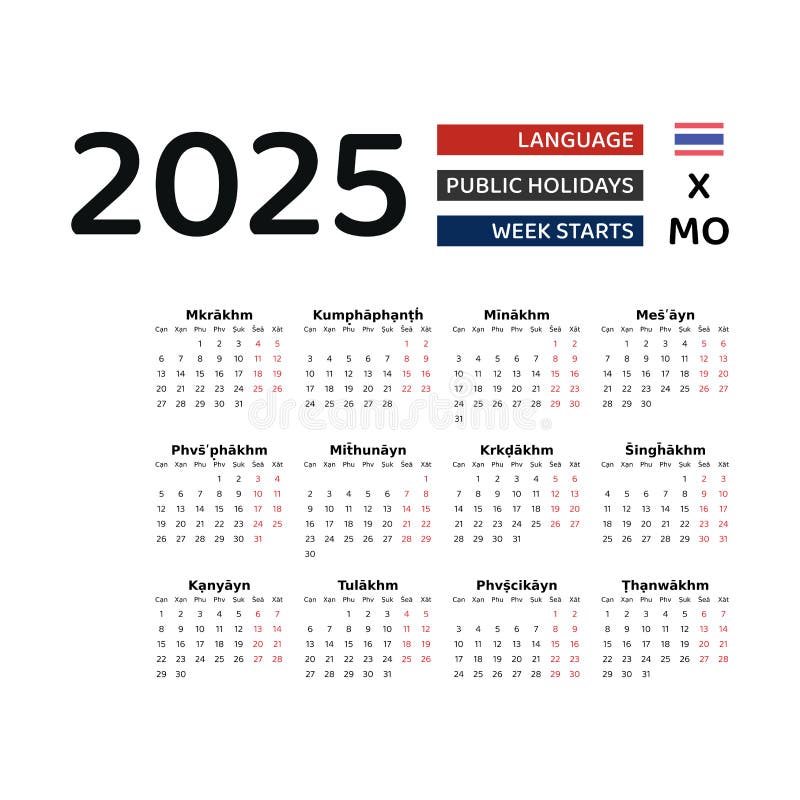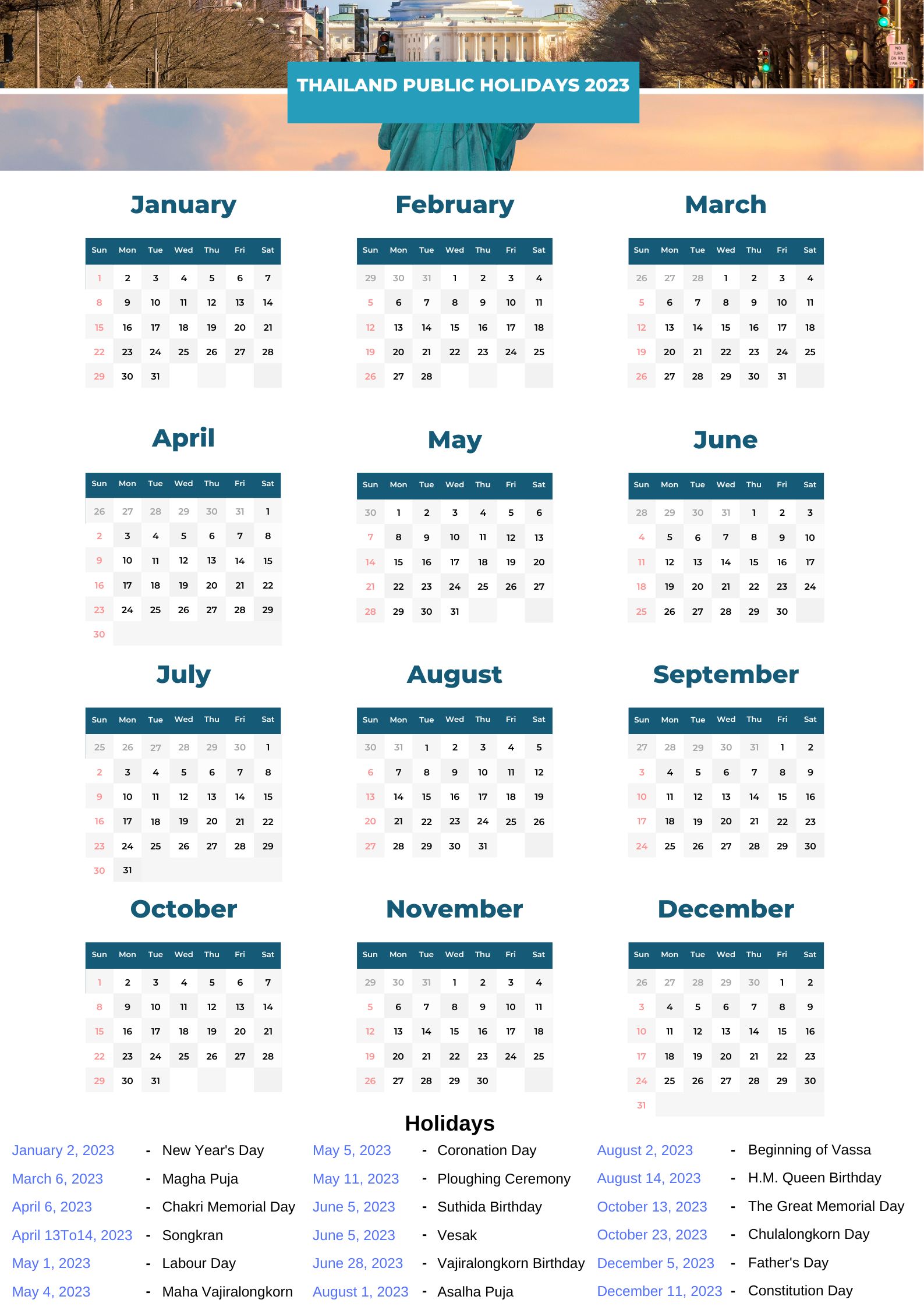Thailand’s Public Holidays In 2025: A Comprehensive Guide
Thailand’s Public Holidays in 2025: A Comprehensive Guide
Related Articles: Thailand’s Public Holidays in 2025: A Comprehensive Guide
Introduction
With enthusiasm, let’s navigate through the intriguing topic related to Thailand’s Public Holidays in 2025: A Comprehensive Guide. Let’s weave interesting information and offer fresh perspectives to the readers.
Table of Content
Thailand’s Public Holidays in 2025: A Comprehensive Guide
Thailand, a vibrant and culturally rich nation, observes a diverse array of public holidays throughout the year, reflecting its unique blend of traditions, religious observances, and historical events. These holidays provide opportunities for Thais to celebrate their heritage, foster communal bonds, and enjoy well-deserved time off. Understanding the significance and timing of these holidays is essential for anyone planning to visit or conduct business in Thailand.
This comprehensive guide provides an in-depth look at Thailand’s public holidays in 2025, outlining their historical and cultural context, and offering practical insights for travelers and businesses.
January
- New Year’s Day (January 1st): This universal holiday marks the beginning of a new year, providing a chance for reflection, resolutions, and festivities.
- Makha Bucha Day (January 29th): This Buddhist holiday commemorates the gathering of 1,250 of the Buddha’s disciples, marking a significant moment in the propagation of Buddhist teachings.
February
- Chinese New Year (February 10th): While not a national holiday, Chinese New Year is widely celebrated in Thailand, particularly in areas with large Chinese communities. It is a time for family reunions, feasting, and auspicious rituals.
March
- Magha Puja Day (March 15th): This Buddhist holiday commemorates the gathering of 1,250 of the Buddha’s disciples, marking a significant moment in the propagation of Buddhist teachings.
April
- Chakri Day (April 6th): This holiday celebrates the establishment of the Chakri Dynasty, which has ruled Thailand for over two centuries. It honors the legacy of King Rama I and his successors.
- Songkran Festival (April 13th-15th): This joyous water festival marks the Thai New Year. It is a time for cleansing, renewal, and merriment, with people splashing water on each other as a symbol of purification.
May
- Coronation Day (May 5th): This holiday commemorates the coronation of King Rama X, the current monarch of Thailand. It is a day of national pride and loyalty.
- Visakha Bucha Day (May 10th): This significant Buddhist holiday marks the birth, enlightenment, and death of the Buddha. It is a time for meditation, reflection, and acts of merit.
June
- Asalha Puja Day (June 13th): This Buddhist holiday marks the day when the Buddha first delivered his teachings. It is a time for spiritual reflection and the observance of Buddhist precepts.
July
- King Bhumibol Adulyadej’s Birthday (July 5th): This holiday honors the late King Bhumibol Adulyadej, revered as the "Father of Thailand," for his long reign and contributions to the nation’s development.
August
- Queen Sirikit’s Birthday (August 12th): This holiday honors Queen Sirikit, the Queen Mother of Thailand, for her contributions to social welfare and the arts.
September
- Chulalongkorn Day (September 23rd): This holiday commemorates King Chulalongkorn, known as King Rama V, who played a pivotal role in modernizing Thailand and establishing its international standing.
October
- National Day (October 23rd): This holiday celebrates the end of absolute monarchy and the establishment of a constitutional monarchy in Thailand.
November
- King Rama I Memorial Day (November 21st): This holiday commemorates the founder of the Chakri Dynasty, King Rama I, for his role in establishing the kingdom and its enduring legacy.
December
- Constitution Day (December 10th): This holiday commemorates the promulgation of the Thai Constitution, marking the country’s commitment to democratic principles and governance.
- Father’s Day (December 5th): This holiday celebrates fathers and their roles in society. It is observed on the birthday of King Bhumibol Adulyadej.
- New Year’s Eve (December 31st): This holiday marks the end of the year, often celebrated with fireworks, parties, and a sense of anticipation for the new year.
Importance and Benefits of Thai Public Holidays
Thai public holidays play a vital role in preserving cultural heritage, promoting social cohesion, and fostering economic activity. They provide:
- Cultural Preservation: Holidays like Songkran, Visakha Bucha, and Chakri Day keep traditional customs and beliefs alive, reminding Thais of their shared history and values.
- Social Cohesion: Public holidays offer opportunities for families and communities to come together, strengthening social bonds and fostering a sense of belonging.
- Economic Stimulation: Holidays often lead to increased tourism and domestic travel, boosting the economy and supporting various industries.
- Time for Reflection and Renewal: Public holidays provide a chance for individuals to step back from their daily routines, reflect on their lives, and recharge.
FAQs
-
Are all public holidays in Thailand observed as national holidays?
- Yes, all public holidays listed above are recognized as national holidays in Thailand, meaning that government offices, schools, and most businesses are closed.
-
How are public holidays typically observed in Thailand?
- Observance varies depending on the holiday. Some are marked by religious ceremonies and processions, while others are celebrated with festive gatherings, parades, and cultural performances.
-
Can I expect businesses to be closed on public holidays?
- Generally, businesses in Thailand are closed on public holidays. However, some tourist attractions, restaurants, and shops may remain open, particularly in popular tourist destinations.
-
What are some tips for traveling during Thai public holidays?
- Book flights and accommodation well in advance, as prices tend to increase during peak holiday periods.
- Be aware that public transportation may be crowded, and some roads may be closed for events.
- Respect local customs and traditions, and dress appropriately for religious sites.
Tips for Businesses
- Plan ahead: Businesses should be aware of upcoming public holidays and adjust their operations accordingly.
- Communicate with clients: Inform clients of potential business closures or service disruptions during holidays.
- Offer alternative arrangements: Consider offering remote work options or flexible scheduling to accommodate employees’ holiday plans.
- Embrace cultural events: Use public holidays as opportunities to engage with Thai culture and build stronger relationships with local communities.
Conclusion
Thailand’s public holidays are a vibrant tapestry of tradition, faith, and national pride. They offer a unique glimpse into the country’s rich cultural heritage, providing opportunities for celebration, reflection, and connection. Understanding the significance and timing of these holidays is essential for anyone planning to visit or conduct business in Thailand, ensuring a respectful and enriching experience.







Closure
Thus, we hope this article has provided valuable insights into Thailand’s Public Holidays in 2025: A Comprehensive Guide. We appreciate your attention to our article. See you in our next article!
You may also like
Recent Posts
- Exploring The World In February 2025: A Guide To Travel Destinations
- Navigating The Summer School Holidays In The UK: A Comprehensive Guide For 2025
- Navigating Singapore’s Public Holidays In 2025: A Comprehensive Guide
- A Comprehensive Guide To Skiing Holidays In January 2025
- Embracing The Winter Wonderland: A Comprehensive Guide To Ski Holidays In January 2025
- Tenerife In April 2025: A Springtime Escape To The Canary Islands
- The Future Of Travel: A Look At Holiday Trends For 2025
- Unveiling The World Of Travel: An Exploration Of Thomas Cook’s 2025 Brochure
Leave a Reply